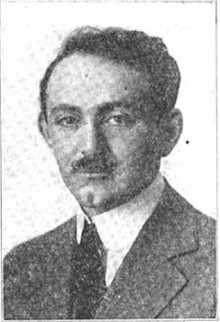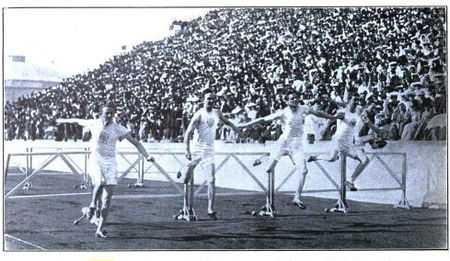Hugo Friend
| Hugo Friend | |
|---|---|
 | |
| Judge of the Circuit Court for Cook County, Illinois | |
| In office September 18, 1920 – April 29, 1966 | |
| Appointed by | Frank O. Lowden |
| Personal details | |
| Born | Hugo Morris Friend July 21, 1882 Prague, Bohemia |
| Died | April 29, 1966 (aged 83) Chicago, Illinois, U.S. |
| Spouse(s) | Sadie Cohn (1920–1966, survived as widow) |
| Alma mater | University of Chicago (undergraduate and law) |
| Occupation | Judge |
| Olympic medal record | ||
|---|---|---|
| Men’s athletics | ||
| Bronze | 1906 Athens | Long jump |
Hugo Morris Friend (July 21, 1882 – April 29, 1966) was an American jurist who, in his youth, competed as an athlete in the long jump and hurdles. He is best remembered as the judge who presided over the criminal trial of the Chicago Black Sox, which ended in an acquittal, but did not affect their ban from baseball.
Friend was born in Prague but came to the United States as an early age. He attended the University of Chicago beginning in 1901, where he became a track star. He was selected for the United States team for the 1906 Intercalated Games in Athens and won a bronze medal.
He became a lawyer in 1908 and a judge twelve years later. He presided over the Black Sox trial in 1921, and when they were acquitted, he responded to the jubilation in the courtroom with a smile. At the time of his 1966 death, he was the oldest active member of the Cook County Circuit Court bench.
Early life and athletic career
Hugo Morris Friend, who was Jewish,[1] was born on July 21, 1882, in the city of Prague, in what was then the Austrian province of Bohemia. At an early age, he emigrated to the United States. He graduated from South Division High School in Chicago in 1901.[2]
Friend attended the University of Chicago, where he was a track star. He twice won the Big Ten long jump championship. Friend was the captain of Chicago's Big Ten champion track team, the first time one of the university's teams had won the Big Ten Championship[3] He was selected for the United States team for the 1906 Intercalated Games (sometimes termed the 1906 Olympic Games) in Athens.[2] and won a bronze medal in the long jump, finishing fourth in the 100 metre hurdles.[3] He also played football for Chicago, though never at the varsity level.[2]
Friend received his undergraduate degree from Chicago in 1906; he continued at the university and secured his law degree in 1908.[2]
Lawyer and judge
Friend joined the Illinois Bar in 1908, and began the practice of law in Chicago. In 1916, he was appointed a Master in Chancery of the Superior Court of Cook County by Judge Albert C. Barnes. On September 18, 1920, Republican Governor Frank Lowden appointed him to the Cook County Circuit Court.[2]
In 1921, Judge Friend was assigned the case of the Chicago Black Sox; the players had been suspended from baseball after having been indicted for throwing the 1919 World Series.[4] The case had been marked by theft of the incriminating statements made by some of the players to the grand jury. At the conclusion of the evidence, Judge Friend said of the cases against two of the players, Buck Weaver and Happy Felsch, that they were so weak that he doubted if he could let the convictions stand.[5] He was not called upon to do so; all of the defendants were acquitted amid scenes of jubilation, observed by a smiling Judge Friend.[5] The following day, Baseball Commissioner Kenesaw Mountain Landis issued a statement stating that no player who had agreed to throw a baseball game, or sat in on meetings to that end, would ever play professional baseball thereafter.[6]
In 1928, Friend presided over the case against Chicago Mayor William Hale Thompson and three codefendants, ordering them to pay over $2 million paid to real estate experts. He was reversed in his judgment against Mayor Thompson and one of the co-defendants by the Illinois Supreme Court.[4]
In 1957, he cleared the way for the movie The Miracle to be shown in Chicago, ruling it was not obscene. He died on April 29, 1966, at age 83 the oldest active Cook County Circuit Court judge, while listening to the broadcast of a Chicago White Sox–Cleveland Indians game.[4]
He was elected in 2006 into the University of Chicago Athletic Hall of Fame. His listing cites his 1906 "Olympic" accomplishments and his Big Ten feats, including his track team captaincy.[3]
Personal life
In 1920, Friend married Sadie Cohn of Chicago.[2]
See also
- List of select Jewish track and field athletes
References

- ↑
- ↑ 2.0 2.1 2.2 2.3 2.4 2.5 "Prominent Alumni". University of Chicago Magazine, March 1921, p. 177. Retrieved on June 23, 2011.
- ↑ 3.0 3.1 3.2 University of Chicago Athletics Hall of Fame. University of Chicago Athletics. Retrieved on June 23, 2011.
- ↑ 4.0 4.1 4.2 "Hugo Friend dies—Chicago judge, 83. The New York Times, May 1, 1966. Retrieved on June 23, 2011. Fee for article.
- ↑ 5.0 5.1 Carney, p. 147.
- ↑ Cottrell, p. 260.
Bibliography
- Carney, Gene. Burying the Black Sox: How Baseball's Cover-Up of the 1919 World Series Fix Almost Succeeded. Washington: Potomac Books, Inc., 2007 (paperback ed.). ISBN 978-1-59797-108-9.
- Cottrell, Robert C. Blackball, the Black Sox, and the Babe. Jefferson, North Carolina: McFarland & Co., Inc., 2002. ISBN 978-7-86411-643-6.
| |||||||||||||||||
| ||||||||||||||||||||